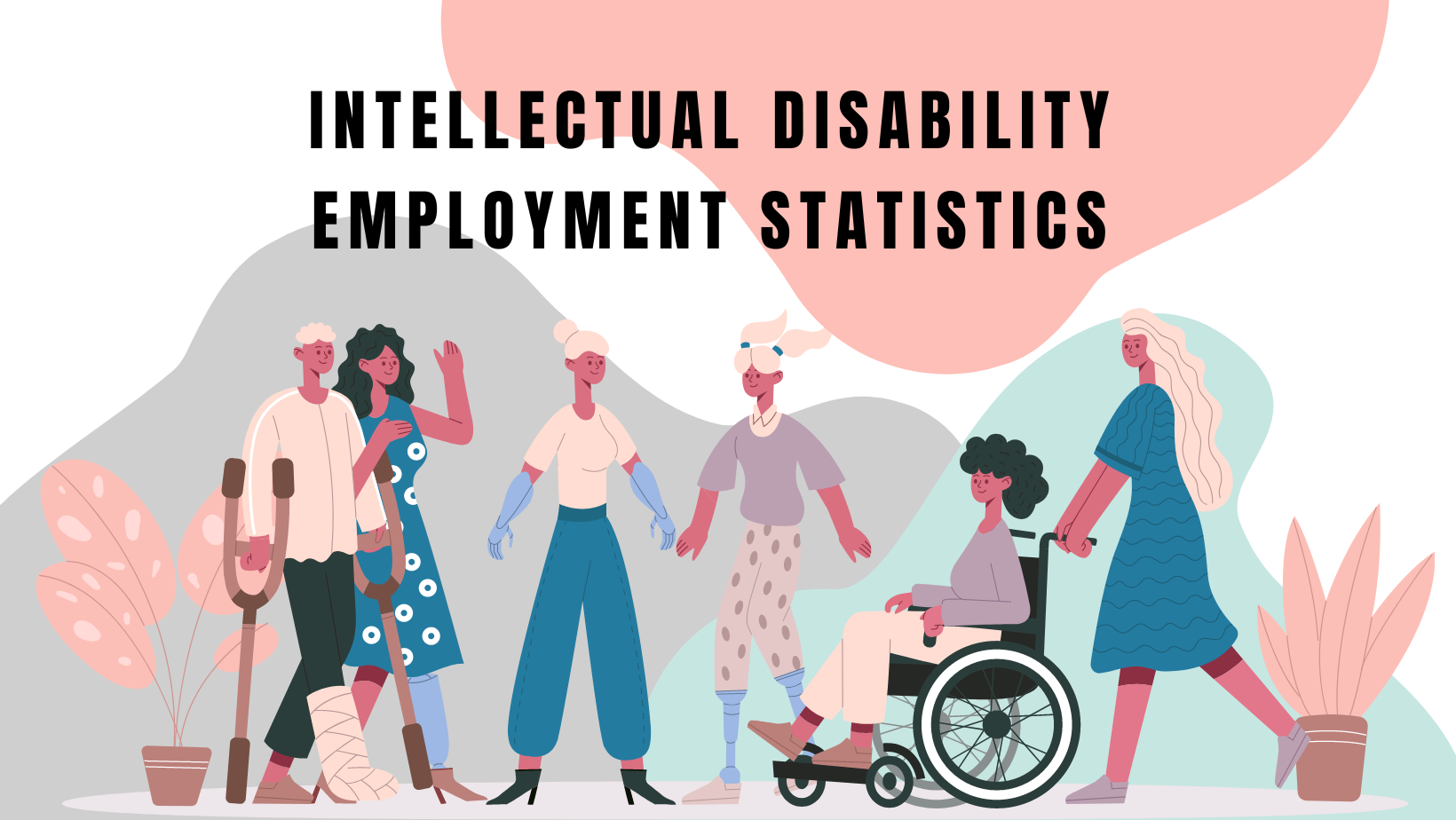Intellectual Disability Employment Statistics | Update 2023

In an inclusive and equitable society, every individual, regardless of their abilities, should have the opportunity to gain meaningful employment. However, for people with intellectual disabilities, finding and maintaining employment has often been a challenging endeavor. In this blog post, we will explore the latest statistics and trends related to intellectual disability employment in 2023.
Working with individuals who have intellectual disabilities and providing them with equally capable jobs has always been a challenge for employers. It takes great effort and consideration on the part of employers to ensure that these individuals find meaningful work and are treated fairly in the workplace.
Fortunately, the landscape is changing, particularly when it comes to employment opportunities for those with intellectual disabilities. Recent advancements in technology, such as AI-driven training programs and job coaches, have made it easier for employers to offer equally capable jobs.
At the same time, many organizations and businesses are increasingly recognizing the value of employing people with intellectual disabilities. They understand that these individuals can bring a unique perspective, talent, and creativity to their work environment. Employers also appreciate the fact that hiring people with intellectual disabilities can help create a more diverse and inclusive workplace, which helps to boost morale and productivity.
Understanding Intellectual Disabilities
Intellectual disabilities, often referred to as cognitive disabilities, encompass a range of conditions that affect an individual’s cognitive functioning and adaptive behavior. These disabilities can manifest in various ways, such as limitations in learning, reasoning, problem-solving, and communication skills.
Challenges Faced by Individuals with Intellectual Disabilities
Historically, individuals with intellectual disabilities have faced significant barriers when seeking employment. These barriers can include discrimination, lack of accessible education and training, and limited awareness among employers about the capabilities of these individuals.
Intellectual Disability Employment Statistics
While we continue to strive for greater inclusivity, the statistics regarding employment for individuals with intellectual disabilities in 2023 reveal both progress and challenges:
- Unemployment Rate: The unemployment rate for individuals with intellectual disabilities remains higher than the general population. However, it has seen a gradual decline in recent years due to increased awareness and initiatives promoting inclusive hiring.
- Labor Force Participation: More individuals with intellectual disabilities are participating in the labor force today than in the past. This is partially attributed to educational programs that prepare them for employment.
- Employment Types: Many individuals with intellectual disabilities find employment in sheltered workshops, where they can work in supportive environments. However, there’s a growing emphasis on integrated employment, where they work alongside their non-disabled peers.
- Wage Disparities: Wage disparities persist, with many individuals with intellectual disabilities earning subminimum wages in certain industries. Advocacy efforts continue to address this issue and ensure fair compensation.
- Job Retention: Job retention rates vary, but they have improved over the years. Employers are increasingly recognizing the value of retaining employees with intellectual disabilities and providing necessary accommodations.

Promoting Inclusivity and Progress
Efforts to improve intellectual disability employment statistics in 2023 and beyond are ongoing. Several key strategies are contributing to positive change:
- Education and Training: Expanded access to education and vocational training programs equips individuals with intellectual disabilities with the skills needed for meaningful employment.
- Employer Initiatives: More companies are implementing inclusive hiring practices and recognizing the benefits of a diverse workforce. This includes offering internships and job shadowing opportunities.
- Disability Awareness: Increasing public awareness and dispelling myths about intellectual disabilities are crucial steps in promoting inclusivity.
- Government Support: Government initiatives, such as tax incentives for hiring individuals with disabilities, continue to drive positive change.
- Advocacy: Advocacy groups and organizations play a pivotal role in championing the rights and opportunities of individuals with intellectual disabilities.
The Current Landscape
As we step into 2023, it’s crucial to take stock of where we stand in terms of employing individuals with intellectual disabilities. While there have been improvements over the years, significant disparities persist. Let’s delve into the latest statistics to gain a better understanding.
- Labor Force Participation: According to the U.S. Bureau of Labor Statistics, as of 2023, only around 19.3% of working-age individuals (ages 16-64) with intellectual disabilities are participating in the labor force. This is significantly lower than the 69.6% labor force participation rate for individuals without disabilities.
- Employment Rate: The employment rate for individuals with intellectual disabilities remains a concern. In 2023, the employment-population ratio for this group stands at approximately 16.8%, while it’s 61.3% for those without disabilities.
- Type of Employment: Many individuals with intellectual disabilities still face limited choices when it comes to the type of work they can secure. In 2023, a significant proportion of them continue to work in segregated, sheltered workshops or in part-time, low-wage positions.
- Wage Disparities :
Wage disparities persist, with individuals with intellectual disabilities often earning significantly less than their counterparts without disabilities. In 2023, their median earnings are roughly 66% of the median earnings for workers without disabilities.
Positive Developments
Despite these challenges, there are positive developments that deserve recognition and encouragement:
- Inclusive Hiring Initiatives
Many companies and organizations have started to implement inclusive hiring practices, recognizing the value that individuals with intellectual disabilities bring to the workplace. These initiatives are gradually creating more opportunities for these individuals. - Government Support: Governments at various levels have introduced policies and programs aimed at promoting the employment of individuals with intellectual disabilities. These include tax incentives for employers, vocational training programs, and greater access to job coaching services.
- Awareness and Advocacy: Increased awareness and advocacy efforts have played a significant role in shedding light on the employment challenges faced by individuals with intellectual disabilities. This has led to more public support and a growing commitment to improving their employment prospects.

The Way Forward
While progress is being made, there is still much work to be done to ensure that individuals with intellectual disabilities have equal access to employment opportunities. Here are some key steps moving forward:
- Inclusive Education: Ensure that individuals with intellectual disabilities have access to quality education and vocational training from an early age to prepare them for the workforce.
- Mentoring and Support: Implement mentoring programs and provide ongoing support to help individuals with intellectual disabilities succeed in their chosen careers.
- Promote Inclusive Workplaces: Encourage more employers to adopt inclusive hiring practices and create work environments that embrace diversity and accommodate individual needs.
- Raise Awareness: Continue to raise awareness about the capabilities and potential of individuals with intellectual disabilities to combat stereotypes and biases.
- Advocate for Policy Changes: Advocate for policies that promote equal employment opportunities, fair wages, and workplace accommodations for individuals with intellectual disabilities.
In addition, organizations are now providing resources to assist employers in making sure their workplaces are accessible for those with disabilities. This includes providing reasonable accommodations, such as offering flexible hours or providing special equipment. These efforts have played an important role in helping to create an environment in which individuals with intellectual disabilities can thrive and succeed.
As a result, the employment rate of those with intellectual disabilities has been steadily increasing in recent years, and the outlook for the future remains positive. The number of equally capable jobs available is expected to continue to grow as more companies recognize the value that these individuals bring and make efforts to provide accessible and inclusive work environments.
The success of those with intellectual disabilities in the workplace is encouraging, and it serves as a reminder that everyone has something to contribute. With more equal capable jobs available, individuals with intellectual disabilities have the opportunity to achieve their goals and make meaningful contributions to society. It’s important that we continue to support these efforts by creating inclusive work environments and providing resources for those with disabilities.
Conclusion
In 2023, the employment statistics for individuals with intellectual disabilities still reflect significant disparities. However, there is reason for optimism as awareness grows, inclusive initiatives expand, and governments and organizations take steps to address these issues. It is incumbent upon all of us to continue the effort to create a more inclusive and equitable workforce where individuals with intellectual disabilities can thrive and contribute their unique talents and perspectives.
As we enter 2023, the employment landscape for individuals with intellectual disabilities is gradually evolving. Positive trends in employment rates, labor force participation, and job retention are heartening. Nevertheless, there is still much work to be done to eliminate wage disparities and create fully inclusive workplaces.
Ultimately, the key to progress lies in continued collaboration among individuals, employers, policymakers, and advocacy groups. By working together, we can build a more inclusive society where individuals with intellectual disabilities have the opportunity to thrive in the workforce and contribute their unique skills and perspectives to the benefit of all.













